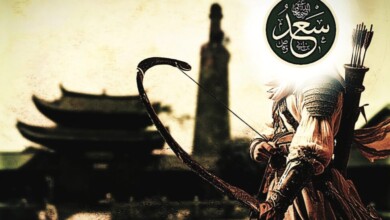Saeed ibn Amir al-Jumahi; a life of selflessness
In the early days of Islam, a young man named Saeed ibn Amir al-Jumahi witnessed an event that would forever change his life. He was among the thousands who gathered to witness the tragic fate of Khubayb ibn Adiy, at Tanim on the outskirts of Makkah.
Khubayb, was a devoted a companion of the Prophet Muhammad (PBUH) who had been captured by the Quraysh leaders. Saeed watched as Khubayb was led to the place set for his death. The Quraysh leaders sought revenge for their losses at the Battle of Badr.
In the face of impending death, Khubayb displayed remarkable calm and conviction. He requested permission to pray two rakaats, which the Quraysh allowed. Saeed observed Khubayb’s calm and composed demeanor as he faced the Kaabah and prayed.
The words Khubayb said at his cruxification still echoed in Saeed’s mind: “If you thought I prayed out of fear, I wouldn’t have bothered.” When asked if he’d prefer Muhammad’s safety over his own, Khubayb replied, “By God, I wouldn’t want to be safe while a thorn hurts Muhammad.” This unwavering dedication in the face of death greatly impacted Saeed.

This experience shaped Saeed’s understanding of faith and conviction, teaching him that true life meant struggling for one’s beliefs, even unto death. Khubayb’s conviction inspired Saeed to embrace Islam. Saeed became a devoted follower, migrating to Madinah and fighting alongside the Prophet Muhammad (PBUH) in battles like Khaybar.
After the Prophet’s passing, Saeed continued serving under Abu Bakr and Umar, two of the Prophet’s closest companions. Umar, impressed by Saeed’s honesty and piety, appointed him governor of Homs. Despite initial reluctance, Saeed accepted, prioritising the welfare of others over personal comfort.
A delegation from Homs informed Umar about Saeed’s remarkable humility and generosity. Umar, moved by Saeed’s selflessness, sent him 1,000 dinars to alleviate his poverty. However, Saeed distributed the wealth among the poor, exemplifying his detachment from worldly possessions.
When Umar visited Homs, the inhabitants complained about Saeed’s alleged shortcomings. Saeed explained each complaint, revealing his humble lifestyle. He baked bread for his family, reserved evenings for prayer, washed his only clothes monthly, and occasionally blacked out, overwhelmed by memories of Khubayb’s martyrdom.
Umar praised Saeed’s integrity, sending more aid. Saeed and his wife used it to support the needy. Saeed’s story showcases a life of unwavering faith, selflessness, and compassion.
Khubayb’s martyrdom taught Saeed valuable lessons. He saw the power of conviction, humility in leadership, detachment from worldly possessions, and compassion. Saeed’s reactions to Khubayb’s martyrdom demonstrate the importance of empathy.


